Immune biomarkers and predictive signatures in gastric cancer: Optimizing immunotherapy responses
IF 2.9
4区 医学
Q2 PATHOLOGY
引用次数: 0
Abstract
Gastric cancer is a malignant disease with a poor prognosis and few therapeutic options once it has advanced. Immunotherapy using ICIs has emerged as a viable therapeutic method; nevertheless, reliable immunological biomarkers are required to identify who may benefit from these therapies. It focuses on key immune biomarkers and predictive signatures in gastric cancer, such as PD-L1 expression, microsatellite instability (MSI), tumor mutational burden (TMB), and Epstein-Barr virus (EBV) status, to optimize gastric cancer patients' immunotherapy responses. PD-L1 expression is a popular biomarker for ICI effectiveness. Tumors with high MSI-H and TMB are the most susceptible to ICIs because they are highly immunogenic. EBV-positive stomach tumors are highly immunogenic, and immunotherapy has a high response rate. Combining composite biomarker panels with multi-omics-based techniques improved patient selection accuracy. In recent years, machine learning models have been integrated into next-generation sequencing. Dynamic, real-time-monitorable biomarkers for real-time immune response monitoring are also being considered. Thus, enhancing biomarker-driven immunotherapy is critical for improving clinical outcomes with gastric cancer. There is still more work to be done in this field, and verifying developing biomarkers will be an important component in the future of customized cancer therapy.
求助全文
约1分钟内获得全文
求助全文
来源期刊
CiteScore
5.00
自引率
3.60%
发文量
405
审稿时长
24 days
期刊介绍:
Pathology, Research and Practice provides accessible coverage of the most recent developments across the entire field of pathology: Reviews focus on recent progress in pathology, while Comments look at interesting current problems and at hypotheses for future developments in pathology. Original Papers present novel findings on all aspects of general, anatomic and molecular pathology. Rapid Communications inform readers on preliminary findings that may be relevant for further studies and need to be communicated quickly. Teaching Cases look at new aspects or special diagnostic problems of diseases and at case reports relevant for the pathologist''s practice.

 求助内容:
求助内容: 应助结果提醒方式:
应助结果提醒方式:


